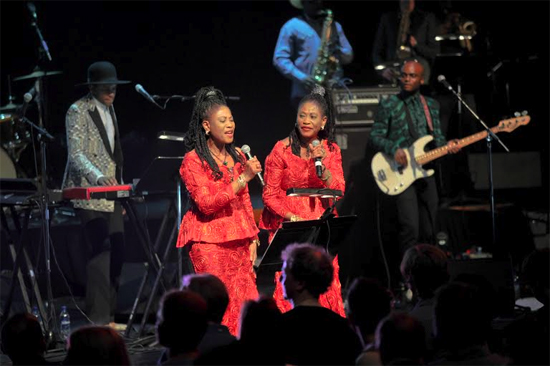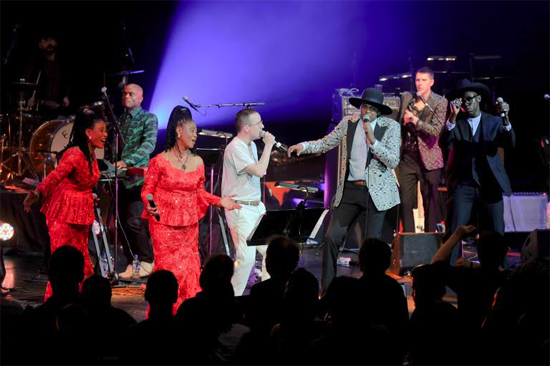I am sitting in the Barbican, looking at the back of Alan Carr’s head. We’re a long way from Enugu in Eastern Nigeria where, between 1978 and 1985, William Onyeabor – filmmaker, turned funk musician, turned businessman, turned evangelist preacher – recorded, pressed and self-released eight groundbreaking albums. Armed with an arsenal of mysteriously obtained analogue synthesisers – from a Soviet benefactor, it has been spuriously proposed – Onyeabor forged a genuinely unique take on the synthesised, loop-driven funk that his Western contemporaries were simultaneously developing.
His recent surge in popularity follows a familiar trajectory: crate-digging DJs came across old copies of his LPs and were shocked by the prescience and enamoured by the groove. It caught the ears of Luaka Bop – the "world music" label started by David Byrne – and a compilation entitled Who is William Onyeabor? was released in 2013. However, unlike other artists who have walked a similar reissue-driven path – Mulatu Astatke, Shuggie Otis or Rodriguez for example – Onyeabor remains reclusive, continuing to cloak himself in impenetrable anonymity.
In order to re-invigorate and celebrate Onyeabor’s legacy, Yale Evelev and Eric Welles Nyström of Luaka Bop have curated two productions of ‘The William Onyeabor Experience’ at the London’s Barbican Centre and Bristol’s Colston Hall. So we have Alexis Taylor, Pat Mahoney, Sinkane, Kele Okereke and Damon Albarn among others performing faithful covers from Onyeabor’s catalogue, all drawn together by musical directors Ahmed Gallab and Money Mark. It’s an eye-catching line-up if there ever was one, but as the house lights go down, it’s hard not to feel a twinge of scepticism.
Our fascination with overseas strains of Western-inspired music continues to grow at unprecedented speeds. With endless compilations and reissues from labels like Soundway, Soul Jazz and Luaka Bop, enter any record shop and you’ll be greeted by pleasing selections of Shah-era Persian funk, Bollywood disco and Zambian psychedelic rock. The benefits of this are obvious, but it can also generate a troubling sense of cultural voyeurism. Is this perhaps one explanation of Onyeabor’s recalcitrance toward his Western fame, reluctant to become a curiosity for an audience of (basically) white, middle-class Barbican-goers? Moreover, many of the qualities that make Onyeabor’s music so appealing – the disembodied quality of his voice, the hypnotic repetition, the tinny gleam on his production – might well disappear in the hands of these all-too professional musicians. Without these characteristics and without Onyeabor himself, what’s left?

Tonight, Atomic Bomb: Who Is William Onyeabor?, at very least, allows me to temporarily forget my worries. This partly due to the night’s overall aesthetic, fashioned to feel like an evangelical service. It begins with a Nigerian pastor walking through the audience under a spotlight, Bible in hand, delivering an impassioned sermon about the revelatory nature of Onyeabor’s music. It’s a bit cute, but an effective device. It’s also a hint as to where the night’s going: this isn’t going to be some winsome "tribute" to Onyeabor, complete with documentary interludes and a Skype chat with his nephew twice-removed, but rather an unashamedly dramatic and ecstatic piece of theatre. Onyeabor’s anonymity is thus carefully exploited whilst his "spirit", as Albarn refers to it, remains present.
The pastor’s sermon bursts into ‘Body & Soul’, with Ahmed Gallab and Mark Money expertly dealing with the four to five synthesisers scattered across the stage. Special mention has to be made for Money, the Beastie Boys-collaborating synth wizard, whose infectious gyrations partly explain why, after the first song, the audience is all too happy leave their seats behind and dance for the next two-and-a-half hours.
Alexis Taylor joins the proceedings for a splendid rendition of ‘Atomic Bomb’, his confident fragility neatly complementing the understated nature of the song. Despite the large "cast" (as the programme refers to them) – there’s a brass section, two drum kits, two more percussionists, and a particularly nimble Jonny Lam on guitar – the ensemble manage to preserve that off-kilter, manicured disjointedness of Onyeabor’s originals. In fact, it’s all going so well that by the time Kele Okereke graces the stage for ‘Heaven & Hell’, you’ve completely forgotten why he annoyed you in the first place.
We’re also witness to the first reunion in thirty years of the Lijadu Sisters, the Nigerian Afrobeat identical twins duo performing two of their classics, ‘Danger’ and ‘Life Gone Down Low’. Given the length of their hiatus they can be forgiven for being a bit rusty, but nonetheless provide much needed diversity to what could have risked becoming an overly male-dominated affair. A besuited Damon Albarn joins them for ‘Fantastic Man’ and is surprisingly deft at channelling a funky passion for Onyeabor, even whipping out his melodica for a seamless solo. Forget his hunched-over moaning about the Westway, the spirit of Onyeabor has transformed him.
Ahmed and Money’s decision to embrace the performance like a piece of theatre, coupled with the sheer quality of Onyeabor songs, means the night never descends into the kind of parodic, self-indulgence it could have done. At times there’s a faint whiff of karaoke in air, and Ghostpoet’s conversational drawl doesn’t add much to ‘Love Me Now’, but that aside, Atomic Bomb is clearly a success. During the finale of ‘Smooth & Good’, with the entire cast on stage, the crowd and performers are in such unison that an audience member even takes to the stage to shred her moves. Ahmed and co look in bemused disbelief. I look to my right and Alan Carr’s having a ball; he’s bought an Onyeabor-style cowboy hat from the foyer and is dancing in the aisles.


